

#Staff Column
2023.07.27
0 LIKE
629 VIEW
-
-
- 메일 공유
-
https://stories.amorepacific.com/en/ushering-in-the-epoch-of-coaching-centric-leadership
Ushering in the Epoch of Coaching-Centric Leadership

Columnist | Introducing the columns written by member of Amorepacific Group
On Coaching and Feedback
Part 2. Ushering in the Epoch of Coaching-Centric Leadership
Part 2. Ushering in the Epoch of Coaching-Centric Leadership

Columnist
Ha kyungtae
Amorepacific Leadership Development Team
Amorepacific Leadership Development Team
In this second article, we will delve into the realm of business coaching. Recognizing the broad spectrum that encompasses business coaching, we'll
“narrow our focus to the coaching and feedback initiatives conducted between leaders and their team members”
in this column.
[Is Coaching/Feedback Indispensable?]
If the Team Members Desire It! And Performance Efforts Surge by 60%!
We're navigating an era that requires us to innovate solutions, leaving behind the days when past answers sufficed. As such, even the most experienced leaders are increasingly confronted with unprecedented situations. This demands a collective effort,
leveraging our collective intelligence to resolve organizational challenges and foster growth. It's incumbent upon leaders to attentively listen to team members who are on the front lines interacting with customers and provide apt coaching and feedback.
Nevertheless, leaders might be concerned: "Are team members genuinely receptive to coaching/feedback, and to what extent?" The following table offers indirect evidence supporting team members' desire for coaching/feedback.
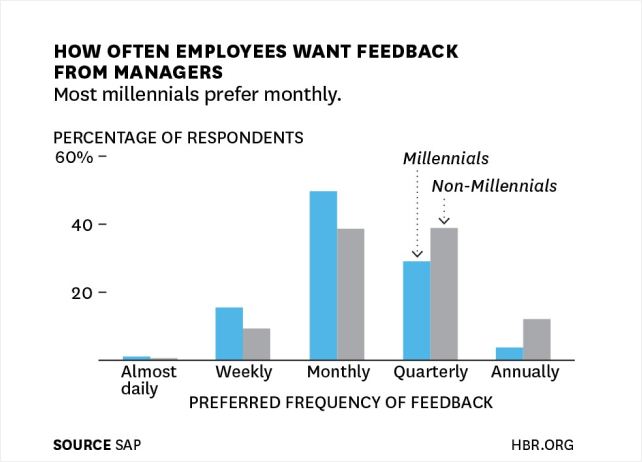
▲Source : HBR
A global consulting powerhouse SAP SuccessFactors study revealed that half of the millennial generation desires monthly feedback. Thirty percent favor quarterly feedback, 17% prefer weekly feedback, and a noteworthy 1% even request daily feedback. Given
these statistics, one can infer the degree to which the Gen Z cohort, known for their proactive approach to personal development and interest in growth exceeding their millennial counterparts, desire feedback that propels personal growth.
It's worth highlighting Stanford University Professor Albert Bandura's research, which concludes that "the effort exerted toward achieving performance goals escalates by around 60% when feedback is offered, as opposed to when only goals are set" (as shown in the table below). Harvard Business School Professor Robert Kaplan's assertion is equally significant: "In the absence of feedback, team members become incompetent, and leaders evolve into autocrats."
It's worth highlighting Stanford University Professor Albert Bandura's research, which concludes that "the effort exerted toward achieving performance goals escalates by around 60% when feedback is offered, as opposed to when only goals are set" (as shown in the table below). Harvard Business School Professor Robert Kaplan's assertion is equally significant: "In the absence of feedback, team members become incompetent, and leaders evolve into autocrats."
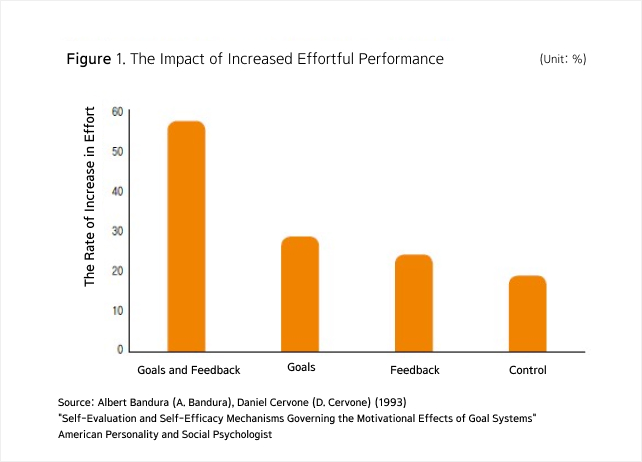
▲Source : HBR
Prominent global corporations such as NETFLIX and Microsoft implement continual 1:1 coaching/feedback throughout the year. Numerous domestic corporations, such as Samsung Electronics, LG, NAVER, Kakao, and Hyundai/Kia Motors, have embraced coaching/feedback
initiatives enthusiastically. Moreover, considering that our company has maintained and promoted a consistent feedback system for over three years, coaching/feedback competencies have undoubtedly emerged as essential leadership skills.
[Prerequisites for Coaching/Feedback]
The Journey Starts with Embracing the Philosophy of Coaching and Showing Genuine Interest in Team Members.
[First Step of Preparation: Embracing the Coaching Philosophy]
Hidetake Enomoto, the acclaimed author of "The Art of Coaching," puts forth a compelling philosophy about coaching. Let's extrapolate his philosophy by applying the notions of "(team members)" and "(leaders)":
Hidetake Enomoto, the acclaimed author of "The Art of Coaching," puts forth a compelling philosophy about coaching. Let's extrapolate his philosophy by applying the notions of "(team members)" and "(leaders)":
* Every individual (team member) harbors the potential and the innate ability to grow.
* The solution to each issue or problem lies within the person (the team member) concerned.
* A collaborator (leader) is indispensable in the quest for solutions.
In other words, it's only after the leader develops faith in the potential and capabilities of the team members, agreeing that these members can independently uncover solutions through coaching, that genuinely empathetic coaching can transpire. While it might be tempting to “dismiss the philosophy amid the rush of coaching/feedback,” its significance cannot be overstated. The absence of this philosophical anchor may lead to the coach's inability to listen attentively to the customer's story, potentially resulting in the coach dominating the conversation.
[Second Step of Preparation: Taking an Interest in Team Members - Observation - Documentation]
The type of interest I'm advocating for stems from "a curiosity about the team members' work, expands into their lives, and ultimately culminates in their personal development ."
The most formidable challenges in the ongoing tasks and the areas where I can extend support—merely showing an interest in these aspects can pave the way for potent coaching/feedback opportunities. Moreover, while posing such questions, the careful selection of expressions, words, tones, and nuances, which help differentiate between genuine interest rooted in trust and intrusive curiosity grounded in suspicion , becomes paramount.
The final step involves observation and documentation. The HBR, back in 2014, had already highlighted the crucial role a leader's observational capacity plays. The critical element in observation is delineating between actual observation and inference , as inferences incorporate the leader's judgments, evaluations, and thoughts. For those keen on honing their observational prowess, I suggest consulting Jan Chipchase's "The Power of Observation."
The significance of maintaining records cannot be overstressed. Nietzsche's saying, "Forgetfulness is a property of all action," rings particularly true here. Furthermore, as elaborated by German psychologist Hermann Ebbinghaus, the forgetting curve research indicates that memory retention dwindles to roughly 44% after one hour, 33% after one day, and approximately 25% after a week.
* The solution to each issue or problem lies within the person (the team member) concerned.
* A collaborator (leader) is indispensable in the quest for solutions.
In other words, it's only after the leader develops faith in the potential and capabilities of the team members, agreeing that these members can independently uncover solutions through coaching, that genuinely empathetic coaching can transpire. While it might be tempting to “dismiss the philosophy amid the rush of coaching/feedback,” its significance cannot be overstated. The absence of this philosophical anchor may lead to the coach's inability to listen attentively to the customer's story, potentially resulting in the coach dominating the conversation.
[Second Step of Preparation: Taking an Interest in Team Members - Observation - Documentation]
The type of interest I'm advocating for stems from "a curiosity about the team members' work, expands into their lives, and ultimately culminates in their personal development ."
The most formidable challenges in the ongoing tasks and the areas where I can extend support—merely showing an interest in these aspects can pave the way for potent coaching/feedback opportunities. Moreover, while posing such questions, the careful selection of expressions, words, tones, and nuances, which help differentiate between genuine interest rooted in trust and intrusive curiosity grounded in suspicion , becomes paramount.
The final step involves observation and documentation. The HBR, back in 2014, had already highlighted the crucial role a leader's observational capacity plays. The critical element in observation is delineating between actual observation and inference , as inferences incorporate the leader's judgments, evaluations, and thoughts. For those keen on honing their observational prowess, I suggest consulting Jan Chipchase's "The Power of Observation."
The significance of maintaining records cannot be overstressed. Nietzsche's saying, "Forgetfulness is a property of all action," rings particularly true here. Furthermore, as elaborated by German psychologist Hermann Ebbinghaus, the forgetting curve research indicates that memory retention dwindles to roughly 44% after one hour, 33% after one day, and approximately 25% after a week.

▲Source : https://namu.wiki
Unrecorded memories often yield to emotions and feelings, invariably influencing our perspective toward team members. While this poses little concern when previous interactions were positive, it becomes a hurdle when constructive feedback is required.
Without precise records, our emotions can seep in, causing potential differences in perception (for instance, "They could have been more proactive," or "The report could have been more organized").
This raises an important question, "What should be the benchmark for record-keeping?" Let me introduce you to the method called ReSCU (Relevant, Specific, Complete, Usual):
This raises an important question, "What should be the benchmark for record-keeping?" Let me introduce you to the method called ReSCU (Relevant, Specific, Complete, Usual):
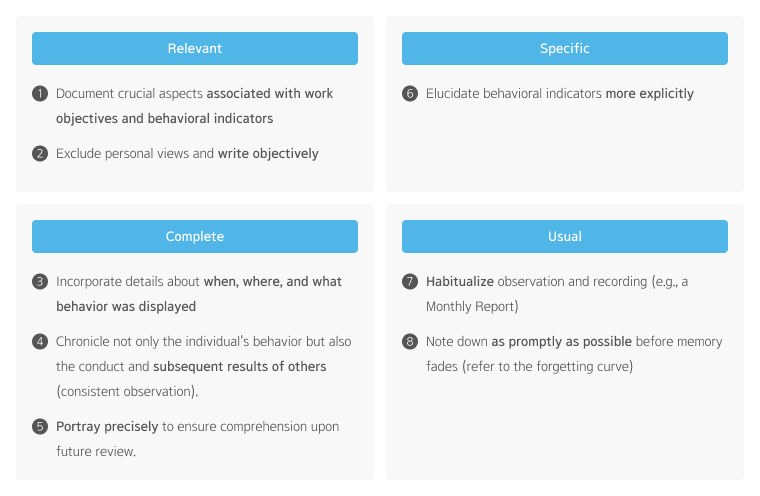
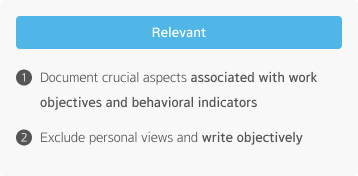
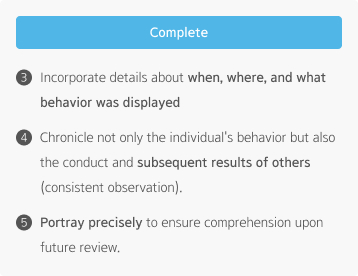
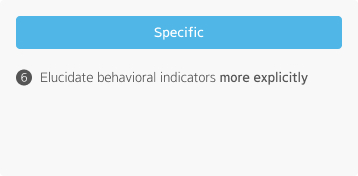
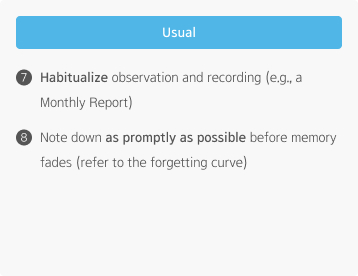
A recurrent term in these criteria is "behavior." The emphasis here lies in the objective of record keeping — to sustain or enhance behaviors. Moreover, I wish to underscore the requirement for comprehensive and detailed documentation of work-related
behaviors.
Indeed, one might worry, "Could observation and record-keeping make team members uncomfortable?" While opinions might vary, let's consider two potential benefits.
For members who have displayed model behavior and generated positive results, record-based feedback provides clarity about their successes. This knowledge empowers them to fortify and expand these skills in future tasks.
Additionally, if specific processes or outcomes fall short and necessitate improvement, record-oriented feedback prevents unnecessary misconceptions (e.g., "Me? When did this happen?") and emotional exhaustion. Such scenarios need not be perceived negatively with concrete, growth-supportive coaching or feedback.
In this second article, we have discussed the necessity of coach-style leadership in the business sphere and associated preparations. As a concluding note, I'd like to share a phrase from an advertisement by a YouTube channel I follow, 3Pro TV:
Indeed, one might worry, "Could observation and record-keeping make team members uncomfortable?" While opinions might vary, let's consider two potential benefits.
For members who have displayed model behavior and generated positive results, record-based feedback provides clarity about their successes. This knowledge empowers them to fortify and expand these skills in future tasks.
Additionally, if specific processes or outcomes fall short and necessitate improvement, record-oriented feedback prevents unnecessary misconceptions (e.g., "Me? When did this happen?") and emotional exhaustion. Such scenarios need not be perceived negatively with concrete, growth-supportive coaching or feedback.
In this second article, we have discussed the necessity of coach-style leadership in the business sphere and associated preparations. As a concluding note, I'd like to share a phrase from an advertisement by a YouTube channel I follow, 3Pro TV:
"When interest piques, observation follows. From observation springs insight."
Authentic interest in team members naturally instigates observation, which in turn, amalgamates into insight for growth-oriented coaching or feedback.
In the upcoming third article, we will delve deeper into the practical aspects of coaching/feedback, with an emphasis on 'What' and 'How.'
In the upcoming third article, we will delve deeper into the practical aspects of coaching/feedback, with an emphasis on 'What' and 'How.'
-
Like
0 -
Recommend
0 -
Thumbs up
0 -
Supporting
0 -
Want follow-up article
0




